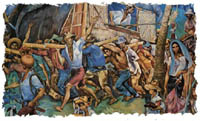DR. BIENVENIDO
LUMBERA, in his labours as a committed scholar, has uncovered what colonialism would have permanently hidden from
generations of Filipinos and the world, that is, the essentially native or ethnic roots of many of the Philippine literary
traditions believed otherwise as parented by outside influences.
Lumbera has set out to
prove that there is, indeed, what Filipinos can call their very own folk tradition, then largely ignored as vernacular or
tribal, lifting up centuries of colonial veil to reveal a clearer picture of their ancient poetry.
No other writer, critic or scholar in the Philippines, has so consistently and strongly lifted the vernacular to its
revered status of today that increasingly encompasses that of the national.
Poets and critics alike have benefited much from Lumbera’s pioneering efforts; in the same fashion that Philippine
letters have been shaken by his revaluation of the people’s artistic past.
Lumbera’s
body of works expressed in thick, irresistible volumes, and the line of scholars that draw inspiration from him, will confirm
how greatly and permanently he has affected such native awakening.
Therefore, the
norm for practically every genre, as far as the Philippines is concerned, especially poetry and theatre, would be the native
or the ethnic, so much against the colonial or global makeup, as contemporary Filipino artists are now more aware of “the
soil in which they root,” to use Lumbera’s own words.
SCHOLAR. Dr. Bienvenido
Lumbera’s act of writing the nation began when, in response to a challenge to write his doctoral dissertation on Philippine
vernacular literature, he confronted the deep cultural malaise afflicting his generation. His dissertation, Tagalog Poetry,
1570-1898: Tradition and Influences in its Development marked his extraordinary return to the roots of his native literary
traditions. Understanding and reconstituting the aesthetics of Tagalog poetry,
he cleared the path for more serious studies in Philippine literature and historiography.
POET. Lumbera’s
study of Tagalog poetic traditions expanded the scope of his own poetry. It freed him from writing only in English. He helped
change the terrain of contemporary Tagalog poetry. In their groundbreaking poetic experimentation, they brought to poetry
the concreteness of objects, sounds, and experiences using ordinary everyday language in a defamiliarized way, thus radicalizing
the notion of Tagalog poetic diction.
DRAMATIST. Here is the
dramatist whose plays are given to the re-education of his people. Lumbera has
not only provided the poetry and venue for other Filipino artists to display the brilliance of their craft. He has also given his audiences new eyes with which to see varied dimensions of the Filipino soul. He has
pioneered in fusing fine arts with popular culture.
AUTHOR. In all his
creative works, Bienvenido Lumbera takes his Filipino audience to a journey to a past that continues to be present, or to
a present that has its roots in the past. Each piece of creative work reveals
a part of the Filipino soul, an aspect of a troubled nation that has lost its memory of the heroism of men and women who struggled
to build and rebuild it. As he nurtures and transmits the collective memory of
his people, he makes them realize the power of that memory. For in remembering, the error of the Filipinos in the past is
learned by heart and their victory, venerated. His works have paved the way for his own self and legions of students to return
home to their own literatures and in the process discover their own identities and participate in the adventure of capturing
the colors and carving the contours of national literature.
Lumbera’s broadness
of vision is central to the opening of the Filipino literary canon, freeing it from the control of dominant literary conventions
and practices. He expanded the canon and included oral lore from the different ethnic groups, “striking down,”
in the process, “the ‘traditional’ concept of Philippine Literature as a body of writing … in the
three ‘principal’ literary languages of the Filipinos, namely, Spanish, English, and Tagalog.” Moreover,
it recuperated women’s writing and gave space to other forms of emergent literature.
Such a comprehensive treatment
of Philippine literature is, in fact, reflective of Lumbera’s attempt to expand the Filipino literary canon and embrace
literatures from the regions. The respect and recognition that regional writings in Cebuano, Hiligaynon, and Iluko now enjoy
is due, considerably, to Lumbera’s efforts. The agenda for the study of vernacular literature that Lumbera set forth
decades ago has now resulted in a literary and cultural landscape that is “better illumined, mapped, and travelled.” Lumbera, to his lasting credit, constantly strives to dismantle the damaging distinctions
between the “national” and the “regional.” Thus the national
for Lumbera is permanently inclusive.
TEACHER. Lumbera indeed
has influenced and nurtured many minds that took up Lumbera’s challenge to return to their own roots and in the process
opened up other paths that would enrich Philippine literary studies and cultural production. Others who were under his tutelage
are now heads of the Literature Departments of their own colleges and universities, managers of key cultural institutions,
writers of textbooks, editors of scholarly tomes, and authors of the country’s literary and scholarly texts. Those he
has influenced have imbibed his nationalist spirit and zeal in working towards a national literature.
NATIONALIST.
Lumbera’s love of country is inextricably bound to his love of art. Because
the country is the people, he strives to create works that renew native myths, evoke memories of historical events, and foreground
the people’s aspirations, always with the goal of bringing the message across to a contemporary audience.

